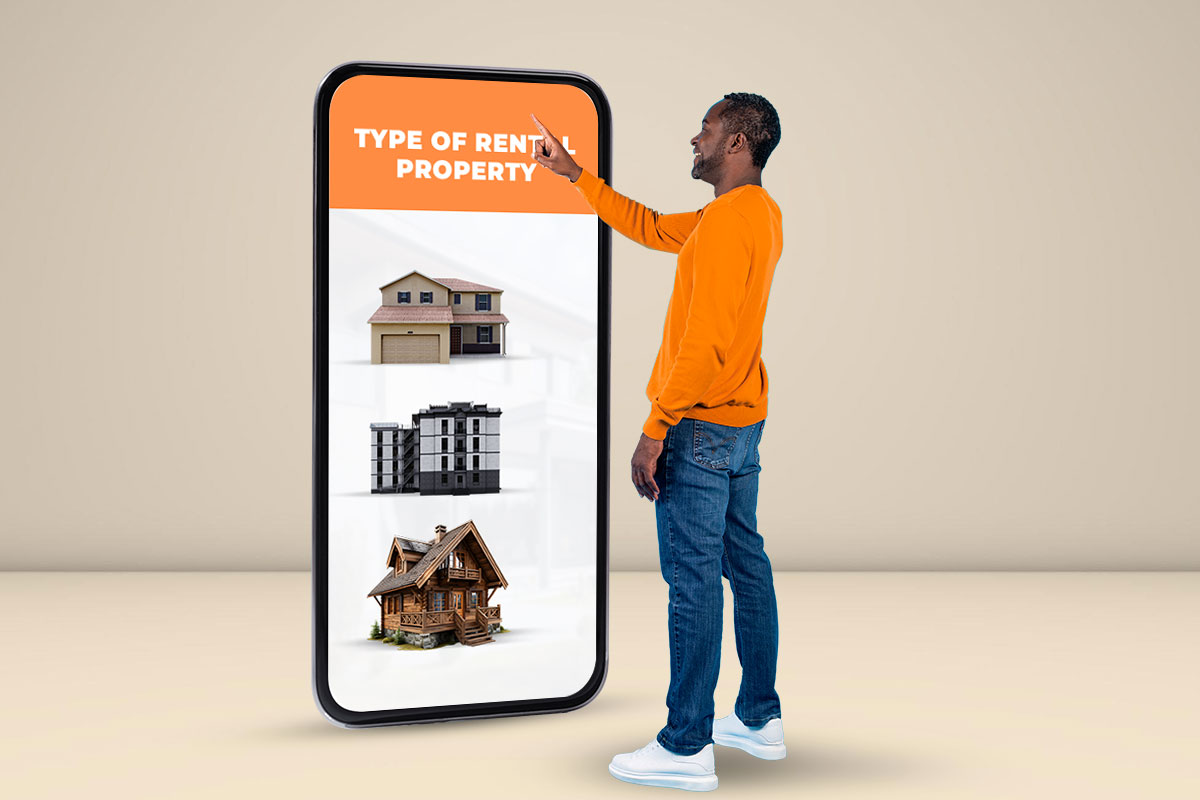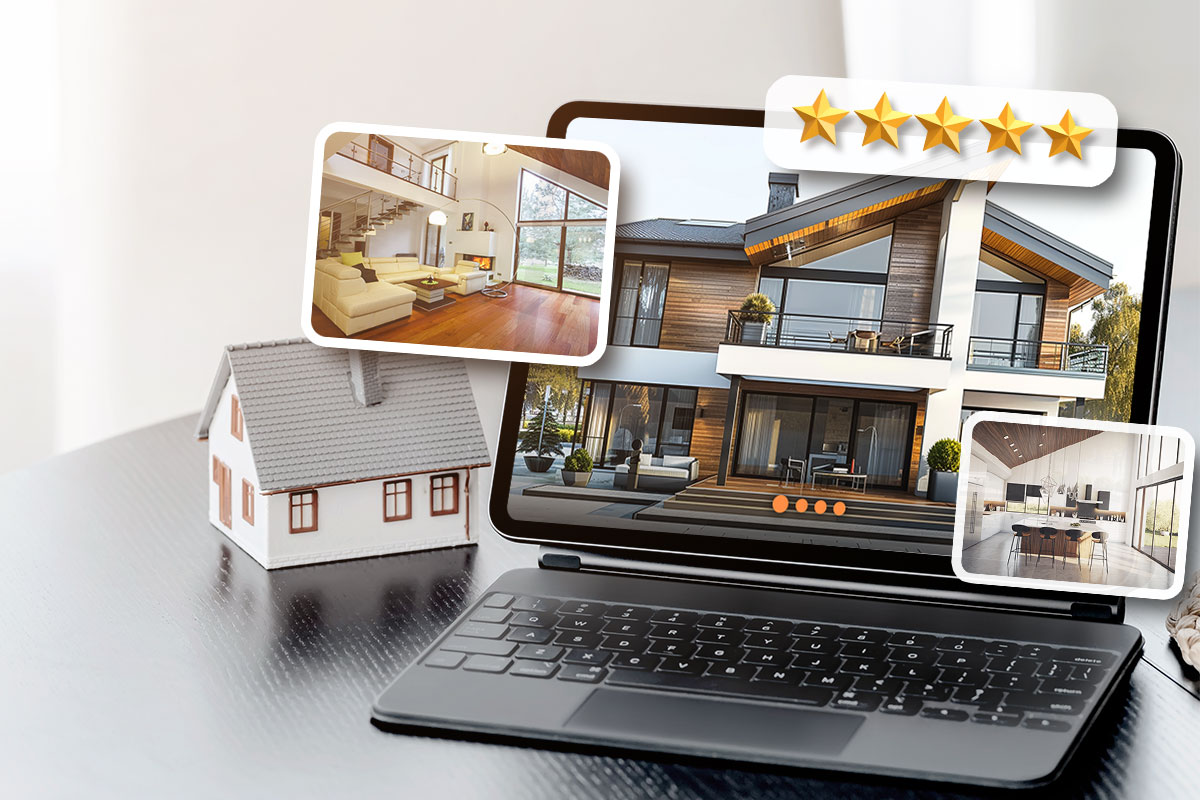According to the Federal Reserve, equity and real estate are staples for earners in the top 50%. That means you need to start investing in real estate if you want to develop long-term wealth.
We talked to Sid Bahadur and Eva Xia to find out how they make $3 million in annual revenue with their rental property business, Nicasa. They share the strategies they use, their profit margins, and how you can do the same.
We’ll show you how to start a rental property business and discuss real estate profitability. We’ll also share how Sid and Eva operate their real estate business. Then we’ll show you how to start a rental property business and answer some frequently asked questions.
You can either keep reading or click on any of the links below to jump to the section that interests you:
Learn About the Rental Property Industry
Is it a good idea to start a rental business?
Yes, it’s a good idea to start a rental business because real estate investments are likely to increase your cash flow and net worth. As your rental property portfolio grows, you can also use the physical assets to secure new properties and expand the business.
How profitable is a rental property business?
The average real estate business has a profit margin of 22.3%. Rental profits vary dramatically based on the location, number of rental properties owned, and the size of the property. The number of rooms in the home, apartment, or trailer will also make a difference in pricing and demand.
According to Apartments.com, the average rent in the U.S. is $1,534 per month with locations ranging from an average of $203 to $4,293 monthly. That means you can expect to make somewhere between $543 and $11,488 in annual profit per property.
Real Estate Business Case Study: Nicasa
Sid Bahadur and Eva Xia started their rental property business Nicasa in 2009. Since then, Nicasa has grown to 22 properties generating between $200K and $400K in monthly revenue.
Sid and Eva rent their own properties through Airbnb and manage other people’s properties.They mostly focus on four-bed, three-bath properties that rent for $500 to $1K per night in the summer and $300 to $500 during the winter.
Most of their properties need 50% occupancy to break even, but they maintain a 70% to 80% occupancy rate. This level of occupancy normally provides a 35% profit margin, which makes it 56.7% more profitable than the average rental property business.
Here’s one of the secrets to their success:
Want to learn more about Sid and Eva’s strategies? Check out the interview below!
How to Start a Rental Property Business
It’s helpful to follow a defined process when you start a rental property business. We suggest using the steps below:
- Create a business plan.
- Choose a business structure.
- Select your business name.
- Identify your ideal clients.
- Choose your niche.
- Decide what services to offer.
- Find your first rental property.
- Manage your finances.
- Get insurance.
- Prepare the property for rentals.
- Get all licenses and permits.
- Find clients by marketing your business.
- Hire employees and subcontractors.
- Apply for rental property business tax deductions.
- Invest in more properties.
Let’s look at how each of these steps makes starting a rental property business easier.
Step #1. Create a Rental Property Business Plan

The real estate business is diverse by nature. Creating a business plan will help you operate your business and secure funding.
Your rental property business plan doesn’t need to be complicated, but it should have enough information to keep your new business on track. At a minimum, we suggest defining:
- Types of rental properties: Decide whether you want to focus on homes, apartments, short-term rentals, or long-term rentals.
- Desired income: The best business is one that provides you with the flexibility to do the things you want in life. How much do you need to make to achieve your goals? How many properties do you need to earn that amount?
- Amount of work you want to do: Consider how active you want to be in your rental property business. If you don’t want to be active at all, you might want to invest in real estate investment trusts (REITs) or hire property managers, but that might impact how quickly you reach your real estate goals.
Step #2. Choose a Business Structure

There are a number of business structures you should consider for your rental property business. Some of the most common are:
- Limited liability company: A limited liability company (LLC) separates the business from your personal assets and allows you to pay taxes on pass-through income.
- C corp: A C corporation provides personal liability protection for your rental properties. You’ll also be allowed to issue shares. However, you’ll be subject to double taxation if you choose this status.
- S corp: This tax structure combines the benefits of a C corp and an LLC. It allows for a limited number of shareholders and requires the managing owner to be paid a salary.
- Series LLC: These LLCs are holding companies. They’re used in the rental business to keep each property separate but allow the administrative costs to be consolidated. They aren’t available in all states and may have tax complications.
- Living trust: Living trusts are often used by individuals with a high net worth to manage real estate and other assets in the event of the owner’s death. These are commonly used in inheritance planning.
- Real estate investment trusts: REITs are real estate corporations that pay out most of their profits in dividends. They’re immune from hostile takeovers by shareholders.
You’ll want to hire an attorney to help you establish which strategy is best for you. Changing the business structure later may be complicated because you’ll normally have loans attached to a rental property.
Step #3. Select Your Business Name
You’ll need to choose a name for your rental property business. Your business name should be easy to remember and spell. Make sure to also check whether it’s available as a trademark, domain, and social media name.
Eva explains:
Check out our list of real estate business names or use our business name generator for more inspiration.
Step #4. Identify Your Ideal Clients
As a rental property business, it’s important to define what type of customers you want. The real estate industry can be diverse, so we’ll give you a few examples of customer groups you might be looking for:
- Short-term rentals: Aim for people who are traveling to your location and staying at least two nights to avoid parties.
- Affordable housing: You’ll want people with good credit and residency history.
- Property management: If you’re a property manager, you’ll look for property owners who are willing to invest in rental properties but don’t want to personally manage them. You’ll also need to target the guests or renters for those properties.
Many of the suggestions in the short-term and property management sections are based on Eva and Sid’s business model.
Step #5. Choose Your Niche

Many people who invest in real estate choose a niche and stick with it. It’s easier to analyze the value of a rental property when you’re an expert in that segment of the real estate industry. Some niches include:
- Airbnb or vacation rentals
- Condominiums
- Luxury rental properties
- Multi-family rental units
- Short-term rentals
- Single-family homes
- Townhomes
As stated earlier, Nicasa focuses on four-bedroom, three-bath real estate deals for Airbnb properties. Those tend to have higher profit margins and are less commonly used for parties as long as you provide a two-day minimum.
In addition, you’ll want to consider competitors in the niche and how you’ll make your real estate stand out. For instance, Nicasa focuses on providing real estate locations away from noise that have hotel-level amenities. One of their properties even has a movie theater.
Step #6. Decide What Services to Offer
You’ll want to select your services based on what customers want. This might be a pool, a big tub, hotel-like dispensers, or other amenities. Sid mentioned that most people overlook the importance of intuitive fixtures.
Meanwhile, long-term renters in an apartment complex might want a fitness center, vending machines, and an Amazon package center. Think about what you’d want in a location, and ask people you know what they like and dislike about the places they stay.
Step #7. Find Your First Rental Property

When choosing your first rental property, there’s a lot to think through. You’ll want to consider:
- Proximity to your home: Managing real estate in your home location is easier. You may have to pay someone else to cover certain tasks if you buy real estate out of town.
- Location: Long-term rentals do better when they’re closer to stores people want to visit. Meanwhile, short-term rentals should be closer to tourist attractions.
- Profitability: Look at how much comparable properties charge and whether you’ll be able to make a return on the property.
- Homeowners associations (HOAs): Homes in HOAs are likely worth more in terms of real estate property value, but they also have more risks. HOAs can arbitrarily raise fees and make your real estate investment less profitable. It’s usually wise to avoid properties with HOAs.
- Noisy areas: Properties around airports, trains, and other noisy areas will often have lower real estate values because fewer people want to stay there. That will impact your real estate business unless you’re focused on business travelers.
Expect to need 20% down if you’re buying a property. In this market, you should expect home property prices between $220K and $800K, according to Bankrate. That means you’ll need between $44K and $160K to purchase a rental property.
Many states are offering first-time homebuyer grants that will cover a reasonable percentage of these costs as long as you live there for a certain period of time. You may be able to start the business using these grants, but you’ll have to wait three years.
Step #8. Manage Your Finances

You’ll want to get a business bank account for your real estate investing business. This will help keep your personal and rental income separate. You’ll also need to get a loan to buy the rental property unless you have the money sitting around to buy the property in cash.
Real estate customer relationship management systems like Bitrix24 make it easier to manage your finances.
Step #9. Get Insurance
You’ll want insurance when starting a rental property company. Landlord insurance policies typically include:
- Dwelling protection: This covers home damage from falling objects, house fires, severe weather, or vandalism. It helps pay for repairs or rebuilding the property.
- Fair rental income coverage: If your rental becomes uninhabitable and your tenants need to move out, this coverage will protect your lost rental income.
- Other structures protection: As its name suggests, this covers structural damage to detached structures on the property.
- Premises liability coverage: Liability coverage protects you if you’re sued after an accident, injury, or death on your property.
- Premises medical protection: In addition to liability, this coverage will pay someone’s reasonable medical bills if they’re hurt on your property.
- Building code: This add-on covers the difference in cost for complying with building codes during construction, maintenance, repair, or demolition.
- Burglary coverage: Burglary coverage protects your property if items or materials are stolen.
- Vandalism coverage: Vandalism coverage offsets the cost of repair or replacement after vandalism. It also includes belongings on the property.
- Rental property under construction: This add-on protects the property when it is under construction and not ready for occupancy.
Step #10. Prepare the Property for Rentals

As mentioned earlier, Sid and Eva live in a property for a year and then prepare the unit for rental. While preparing the location, they add furniture, blackout blinds, intuitive appliances, security devices, and toiletry dispensers.
You may also need to do more extensive remodeling depending on the condition of the property. Sid explained that, at a minimum, it normally takes approximately three months to go from purchase of a new property to renting to tenants.
Step #11. Get All Licenses and Permits
Depending on where you live, you’ll need to get licenses and permits. Some locations have special requirements if you have tenants or operate a short-term rental company. Make sure you check with your city, county, and state government to confirm you’re complying with all laws.
Step #12. Find Clients by Marketing Your Business

Sid told us:
That thought needs to drive everything you do. When starting a rental property business to earn passive income, you’ll want to set up your website, Google Maps, and Yelp. Depending on your niche, there are other sites you might want to use as well.
Search engine optimization (SEO) is one of the most important marketing tools for starting a rental business. SEO is the art of creating web pages in a way that they satisfy a user’s search intent better than other resources. Some of the search terms that Sid targets to find properties to manage include “[city] Airbnb management” and “[city] vacation rental management company.”
Other places where you can find rental property investors and tenants include social media and business directories. If you focus on investment property management, you might want to join real estate investor groups to network with other investors.
Step #13. Hire Employees and Subcontractors
Starting a rental property company involves more than just buying a property, finding tenants, and collecting cash. You’ll need to manage the property or hire a property manager. Responsibilities may include:
- Setting up a payment system
- Managing maintenance and repairs
- Complying with local regulations
- Renewing leases
- Finding new tenants
- Hiring subcontractors for cleaning
Whether you’re overseeing your own property or hiring a manager, you’ll need to do your research to make sure that you’re still competitive in today’s markets.
Step #14. File Rental Property Business Tax Deductions
Keeping track of all income and expenses makes it easier to calculate your overall profit. Most rental property businesses incur these expenses:
- Mortgage interest
- Property taxes
- Operating expenses
- Depreciation
- Repairs
- Taxes
- Advertising
- Maintenance
- Utilities
- Insurance
If you reimburse your tenants for repairs, you can include those payments or rent deductions as expenses. Check out the rental property guidance from the Internal Revenue Service for more information. In addition, individual states may have their own rules for filing taxes on real estate.
Step #15. Invest in More Properties

As you start collecting payments from your investments, you’ll want to continue investing in real estate to expand your cash flow. However, it’s important to always leave yourself enough room for unexpected repairs like fixing an air conditioner.
Additionally, while most investors have the ability to refinance loans, be careful about when you do this. The current market has substantially higher interest rates than many current owners have.
Rental Property FAQ

What type of business is best for rental properties?
A limited liability company (LLC) is the best option for rental properties because it provides personal liability protection and allows for pass-through income.
What rental properties are most profitable?
The most profitable rental properties have multiple tenants within the same structure. This category includes apartment complexes, duplexes, quadplexes, and condos. While these tend to create more passive income because you have more rental units, they won’t normally appreciate as fast as a single-family home.
You’ll need to define your investing goals to determine which property makes the most sense for you when you compare rent, expenses, depreciation, and valuation growth.
How to start a rental property business with no money
There are several ways to start a property rental business without money. Some popular methods include:
- House hacking: With this strategy, you simply rent out rooms in your home for extra income.
- Rental arbitrage: Make a deal with a property owner to rent a place with a subleasing agreement in place.
- Business partners: When you don’t have money, you can find someone with the cash to partner with you.
Learn more about how to invest in real estate.
Closing
Starting a rental property business isn’t a quick path to fame and fortune, but it’s easy to scale and has a history of long-term success. Plus, owning real estate is one of the major keys to building personal wealth.
We’ve discussed how to start a rental property company and highlighted key tips from experienced business owners in this sector. We also answered some of the most frequently asked questions about the industry.
Where are you thinking about starting a rental property business? Let us know in the comments below.





